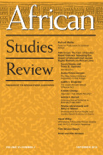
African Studies Review
Scope & Guideline
Pioneering Multidisciplinary Insights into African Studies
Introduction
Aims and Scopes
- Interdisciplinary Research:
The journal encourages contributions that draw from multiple disciplines, including history, sociology, anthropology, political science, and cultural studies, fostering a comprehensive understanding of African issues. - Focus on Contemporary Issues:
ASR publishes articles that engage with pressing contemporary themes such as governance, human rights, gender, and environmental challenges, aiming to provide insights into current dynamics within African societies. - Emphasis on African Perspectives:
The journal seeks to amplify African voices and scholarship, promoting works that prioritize local knowledge systems and experiences over external narratives. - Historical Contextualization:
Articles often contextualize contemporary issues within historical frameworks, allowing for a deeper understanding of ongoing challenges and transformations in Africa. - Cultural Representation and Critique:
The journal showcases African literature, art, and cultural practices, analyzing their role in shaping identity, resistance, and social change. - Global Interconnections:
ASR explores Africa's place within global contexts, investigating transnational relationships and the impacts of globalization on African societies.
Trending and Emerging
- Digital Humanities and Technology:
There is a growing interest in the intersection of technology and African studies, with emerging themes focusing on digital narratives, online activism, and the impact of social media on societal change. - Environmental Justice and Climate Change:
Research addressing environmental issues, sustainability, and climate change is increasingly prominent, highlighting the challenges faced by African communities in the context of global environmental crises. - Migration and Mobility:
The journal is reflecting a heightened focus on migration dynamics, including diaspora studies and transnationalism, emphasizing the complexities of identity and belonging in a globalized world. - Health and Pandemic Responses:
The COVID-19 pandemic has catalyzed research on health systems, public health responses, and socio-economic impacts, leading to a rise in articles examining health-related themes in African contexts. - Intersectionality in Social Movements:
Emerging discussions on intersectionality are gaining traction, with a focus on how various identities (gender, race, class) intersect within social movements and political activism across the continent.
Declining or Waning
- Colonial Histories:
There has been a noticeable decrease in articles specifically focused on colonial histories and their direct implications, as contemporary themes take precedence over historical analysis. - Traditional Gender Roles:
Research exploring traditional gender roles in Africa seems to be waning, with a shift towards more nuanced discussions of gender identities, intersectionality, and feminism. - Rural Studies:
While rural issues remain important, the emphasis on urbanization and its associated challenges has overshadowed rural-focused research, leading to a decline in publications on rural studies. - Single-Narrative Histories:
The focus on singular historical narratives is diminishing, as the journal increasingly favors complex, multifaceted approaches that incorporate diverse perspectives and experiences. - Static Cultural Representations:
The representation of African cultures is moving away from static or monolithic portrayals, as scholars aim to capture the dynamism and fluidity of cultural identities.
Similar Journals
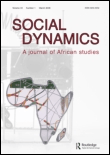
Social Dynamics-A Journal of African Studies
Connecting Cultures, Politics, and Economies of AfricaSocial Dynamics: A Journal of African Studies, published by Routledge Journals, Taylor & Francis Ltd, serves as a vital platform for discourse on contemporary issues affecting the African continent. With an ISSN of 0253-3952 and an E-ISSN of 1940-7874, this journal has been disseminating high-quality research since 1975 and converges through to 2024. It holds a commendable standing within the academic community, ranked in the Q3 quartile of social sciences and positioned at #344 out of 604 in its Scopus category. The journal aims to explore interdisciplinary themes that resonate within the social sciences, offering insights on the dynamic cultural, political, and economic landscapes of Africa. While the journal currently does not offer Open Access, its contributions remain indispensable for researchers, professionals, and students seeking to engage with the complexities of African studies and global implications. The journal's address is 2-4 Park Square, Milton Park, Abingdon OX14 4RN, Oxon, England, underscoring its commitment to scholarly excellence from the UK.

Annee du Maghreb
Exploring the Rich Tapestry of Maghreb CulturesAnnée du Maghreb, published by CNRS Éditions, is an esteemed open-access journal dedicated to advancing the study of Mediterranean and North African cultures, history, and societies. Since its inception in 2004, the journal has aimed to foster a deeper understanding of the complex socio-political dynamics, artistic expressions, and historical contexts of the Maghreb region. By providing a platform for rigorous research and interdisciplinary dialogue, Année du Maghreb plays a pivotal role in enriching academic discourse and enhancing knowledge within the fields of anthropology, history, and cultural studies. Accessible to a global audience, this journal invites researchers, professionals, and students to contribute to its growing repository of scholarly work, ensuring the continuation of high-quality discussions pertinent to this vibrant area of study.

MISSISSIPPI QUARTERLY
Cultivating Critical Dialogue in the HumanitiesMISSISSIPPI QUARTERLY, published by Johns Hopkins University Press, is a distinguished journal that delves into the realms of Cultural Studies and Literature and Literary Theory. Since its inception, the journal has served as a vital platform for scholarly exchange and critical analysis, making significant contributions to understanding literary and cultural phenomena through varied interdisciplinary approaches. With an ISSN of 0026-637X and an e-ISSN of 2689-517X, it operates without Open Access, ensuring a selective dissemination of high-quality research. Despite being positioned in the Q4 quartile based on the 2023 ranking, it maintains a unique appeal for researchers, professionals, and students seeking to navigate the complexities of culture and literature. The journal has converged its publishing years to remain relevant amid evolving academic discourses, ensuring that it continues to address contemporary challenges and themes in literature. As an important academic resource, MISSISSIPPI QUARTERLY promises to stimulate discussion and provoke thought, inviting new voices to contribute to the ongoing dialogue in these critical fields.
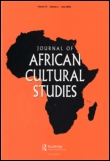
Journal of African Cultural Studies
Illuminating African Voices in Cultural DiscourseJournal of African Cultural Studies is a premier academic journal published by Routledge Journals, Taylor & Francis Ltd, dedicated to advancing research in the diverse fields of cultural studies, linguistics, literature, music, and the visual and performing arts within the African context. Recognized with a prestigious Q1 ranking across multiple disciplines, including Cultural Studies and Literature, it ranks highly in its category, illustrated by its significant positions in Scopus rankings, showcasing its relevance and influence in shaping discourse. The journal aims to provide a platform for scholarly contributions that explore the rich tapestry of African cultures and their global impacts, engaging researchers, professionals, and students alike in vibrant dialogues. With a commitment to quality and innovation, the Journal of African Cultural Studies serves as an essential resource for anyone seeking to deepen their understanding of African cultural expressions and their significance in the contemporary world.
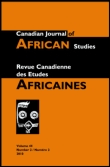
CANADIAN JOURNAL OF AFRICAN STUDIES
Bridging Cultures: A Scholarly Journey into Africa's Past and PresentThe Canadian Journal of African Studies is a premier scholarly publication dedicated to the exploration and critical analysis of African cultures, societies, and histories. Founded in 1976 and published by Routledge Journals, Taylor & Francis Ltd, this journal serves as a vital platform for researchers, educators, and practitioners in various fields, including Anthropology, Cultural Studies, History, and Political Science. With its notable Scopus rankings, including a 96th percentile in History and a 89th percentile in Cultural Studies, the journal exemplifies academic excellence and influence within the social sciences. Although the journal does not currently offer open access options, it remains committed to providing high-quality research articles that contribute to the understanding of African issues in a global context. By addressing pressing social and political challenges, the Canadian Journal of African Studies not only serves academic interests but also fosters a deeper appreciation of Africa's diverse experiences and perspectives.

Tydskrif vir letterkunde
Exploring the Rich Tapestry of South African LiteratureTydskrif vir letterkunde is an esteemed open-access journal published by UNIV PRETORIA, dedicated to the exploration and discourse surrounding literature and cultural studies in the South African context and beyond. With an impressive Q1 ranking in Literature and Literary Theory and a Q2 ranking in Cultural Studies as of 2023, this journal serves as a vital platform for researchers, professionals, and students alike, aiming to bridge theoretical concepts with contemporary literary practices. Since becoming open access in 2015, it has broadened its reach, allowing for greater collaboration and knowledge dissemination within the global academic community. By welcoming diverse voices and innovative research, Tydskrif vir letterkunde not only contributes to the rich tapestry of literary scholarship but also fosters critical dialogue around cultural issues, ensuring its relevance in an ever-evolving field.
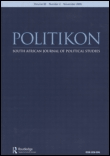
Politikon
Navigating the Intricacies of International RelationsPolitikon is a prestigious journal published by Routledge Journals, Taylor & Francis Ltd, focusing on the dynamic fields of Political Science and International Relations as well as Sociology. With an impressive history dating back to 1974, the journal has established itself as a significant contributor to scholarly discourse, reflected in its 2023 categorization within Q2 quartiles in both the Political Science and International Relations category and the Sociology and Political Science category. Although Open Access options are not currently available, Politikon provides valuable insights and rigorous research that are instrumental for academics, practitioners, and students alike. The journal has also achieved notable Scopus rankings, showcasing its relevance in the social sciences arena. By exploring contemporary political issues and sociopolitical phenomena, Politikon continues to be a vital resource for those seeking to understand the complexities of governance, policy-making, and societal dynamics on a global scale.

ENGLISH STUDIES IN AFRICA
Unveiling the Literary Heritage of AfricaENGLISH STUDIES IN AFRICA is a premier journal dedicated to advancing the field of literature and literary theory, published by Taylor & Francis Ltd, a leading name in academic publishing. With a focus on the intersection of English studies and African contexts, the journal has been a vital platform for over six decades, contributing to an enriched understanding of literary culture within the African diaspora from 1958 to 2024. While its impact factor is not explicitly listed, its Scopus rank of 146 out of 1106 journals in the category places it within the top 14% of its field, reflective of its significant scholarly contribution and rigorous peer-review process. As an essential resource for researchers, professionals, and students alike, ENGLISH STUDIES IN AFRICA fosters critical dialogue and interdisciplinary collaboration, making it a cornerstone for ongoing literary exploration and research in the region.
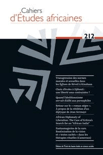
CAHIERS D ETUDES AFRICAINES
Challenging Narratives, Enriching Understanding of the African ExperienceCAHIERS D ETUDES AFRICAINES (ISSN: 0008-0055, E-ISSN: 1777-5353) is a distinguished academic journal published by EDITIONS ECOLE HAUTESETUDES & SCIENCES SOCIALES, based in France. With a rich history since its inception in 1975, this journal provides an invaluable platform for scholarly discourse in the fields of African studies, history, and social sciences. Despite being classified in the Q4 quartile for Development and Geography, Planning and Development, it holds a notable Q2 designation in History, catering to an audience that challenges conventional narratives and seeks to deepen their understanding of the African continent's multifaceted historical and contemporary issues. Although not currently open access, the journal remains an essential resource for researchers, professionals, and students dedicated to advancing knowledge and promoting meaningful discussions around African studies. With the scope spanning various dimensions of socioeconomic and cultural development, CAHIERS D ETUDES AFRICAINES consistently engages a diverse readership keen on exploring and contributing to the understanding of Africa's role in global contexts.
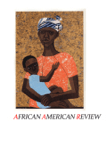
AFRICAN AMERICAN REVIEW
Fostering Insight into African American Artistic ContributionsAFRICAN AMERICAN REVIEW, published by the Johns Hopkins University Press, stands as a pivotal journal since its inception, dedicated to exploring the multifaceted aspects of African American literature, culture, and artistic expression. With an ISSN of 1062-4783 and an E-ISSN of 1945-6182, this journal provides a critical platform that delves into the rich tapestry of African American experiences, bridging gaps across literary, cultural, and visual arts disciplines. Its latest impact metrics position it in esteemed quartiles, achieving Q2 rank in both Literature and Literary Theory and Visual Arts and Performing Arts, alongside a strong presence in Cultural Studies with a Q3 classification. The journal’s commitment to high-quality scholarship is reflected in its Scopus rankings, drawing attention from researchers and scholars invested in cultural narratives and historical contexts. Although not currently open access, the journal's comprehensive analyses contribute significantly to discussions in academia and beyond, making it an essential resource for researchers, educators, and students alike looking to deepen their understanding of African American contributions to the arts and humanities.